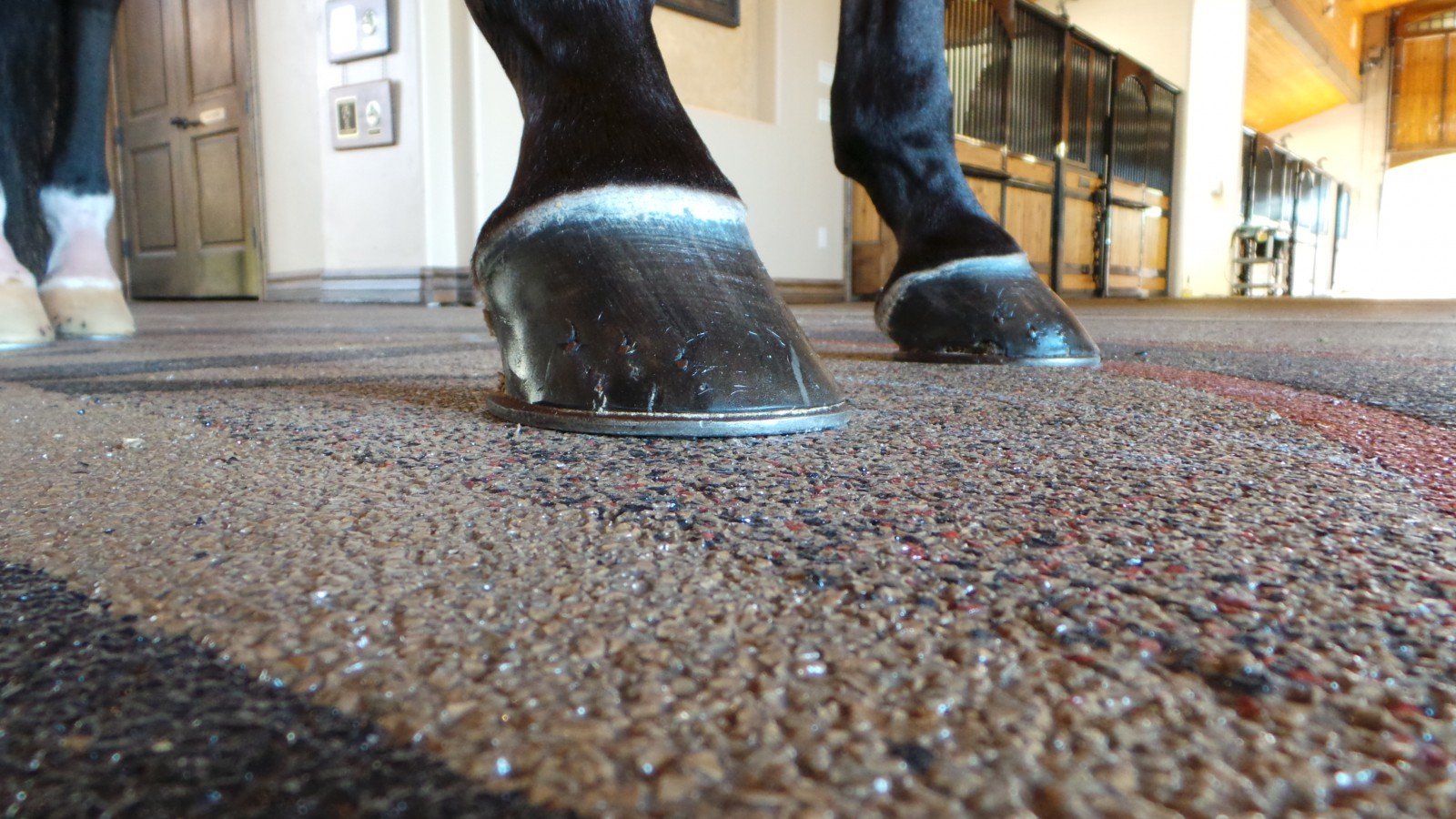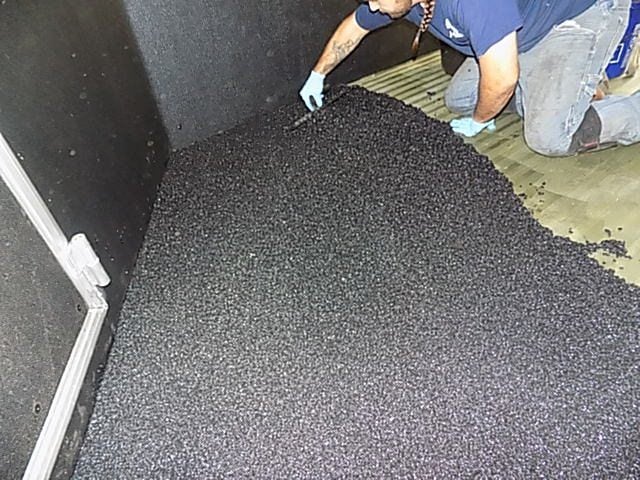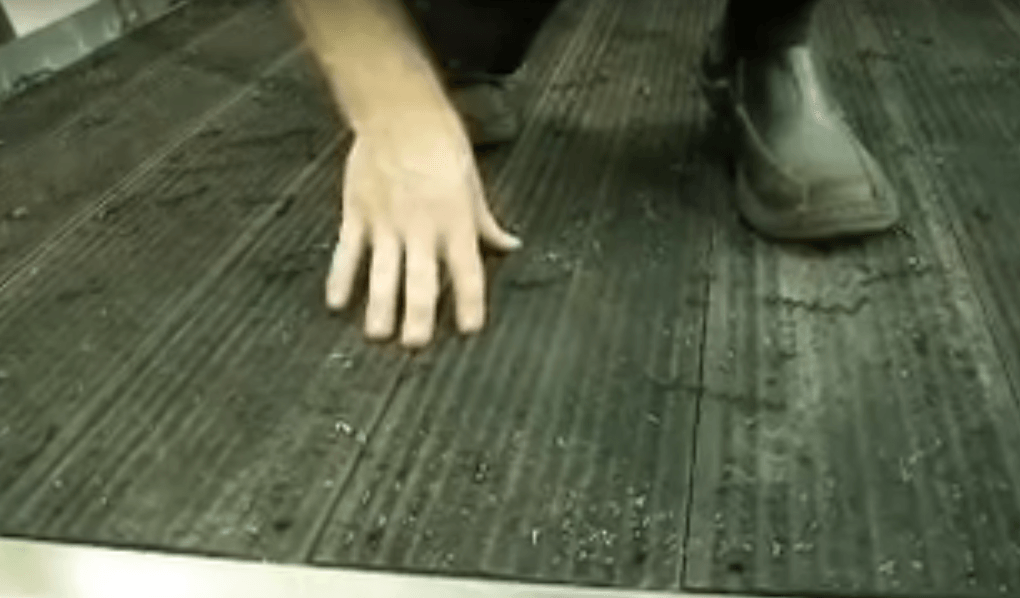Why We Don’t Recommend WERM, Polylast or Rhino Lining for Your Horse Trailer Floor
Sometimes, products look beautiful on the surface but are hiding dangerous problems underneath. This is the case with horse trailer floor coatings made out of ground up rubber bits or chemical compounds. These spread-on/spray-on materials are available under several brand names including Polylast, WERM, and Rhino Lining. Here at Double D Trailers, we don’t recommend these products because they can present some very serious safety concerns in your horse trailer.
There are several reasons why horse owners may be tempted to buy these spread-on/spray-on materials. First off, they look really fantastic! The Polylast or WERM products coat your trailer floor providing a cushioned surface on which your horse can stand. Rhino Lining is a spray on product that is designed to protect and preserve the interior of your trailer while providing a shiny and smoother surface.

Polylast (shown above) and WERM are both made of rubber bits mixed with an adhesive that is spread over the existing floor of your trailer. While we think this is a great product for barns and sporting complex, we don't recommend it for horse trailer floors. (Image credit)
Next, these trailer floor coatings often eliminate the need for rubber mats. Many trailer owners with aluminum or wooden floors dread moving mats regularly in order to wash and dry out the trailer after use.
Regular mat removal is especially important with aluminum trailers since any sort of moisture that is left to sit on the metal surface can begin the process of corrosion that will eventually lead to severe floor weakening and failure.
Polylast and WERM flooring systems are made from a chemical bonding agent that is mixed with recycled rubber tire bits. Just like cement, the mixture is poured onto the existing trailer floor and spread around with a trowel during the 3-day installation process.
Brad admitted, “All of these products are fantastic in certain applications.” It just turns out that trailers are not one of those ideal applications. It does nothing to strengthen or reinforce the existing floor, but simply covers it over permanently, hiding any potential problems that develop underneath.
Problems With Polylast, WERM, and Rhino Lining Horse Trailer Flooring
Any aluminum or wooden floor on which these products might be installed needs to be kept clean and dry in order to maintain strength and integrity. “When we’re applying these products over a new floor, people only see the top side and enjoy the fact that the mats are no longer required,” Brad explained. “The issue is that these flooring types are only as good as the application.”
WERM (shown above) and Polylast are both applied to the trailer floor using a trowel to spread the material into an even layer.
WERM trailer floors are advertised to be 100% waterproof. A product installer from Texas who spoke to us on the phone assured us that no moisture would come in contact with the original flooring. Still, we question whether a perfect application can be achieved each and every time with WERM and the spray-on Rhino Linings.
Anytime you are bonding one product to another surface, there is potential that human error will cause weak bonded sections. These gaps between the product and original floor are perfect for water to secretly invade and begin corroding your floor without your knowledge.
“If the preparatory work is not done perfectly, the seal is going to delaminate,” Brad continued. “I just don’t see how they can prevent condensation from happening between these two layers.” Moisture even from something simple like an environmental temperature change can cause the metal to sweat.
Simply put, there are just too many factors to consider with each installation. How old is the trailer? What kind of aluminum is present? What type of finish was used on the metal? All of these questions combine to make it highly unlikely that a perfect seal will develop.
Polylast, on the other hand, specifically advertises that their product is porous so that water can drain through. In order to prevent water and urine from forming puddles in your trailer, the installers drill regular 1/4” holes into the surface of your metal floor.
The representative we spoke to claims that this does not weaken the floor, but surely a floor with no holes is stronger than one that has several hundred. We are also not confident that these holes would drain enough of the water to prevent the remaining aluminum from coming into regular and long contact with water.
Spread-on or spray-on flooring types may be installed on brand new trailers or on trailers that are several years old. If your aluminum floor is already showing signs of corrosion, this type of flooring should certainly not be considered a ‘fix’ or repair. It will not reinforce your floor.
Using these products is much like putting a rug over a rotten floorboard in your house. Don’t be surprised one day when the board gives out and your leg (and the rug) fall through the floor. Except in this instance, it’s your horse’s leg that will fall through the horse trailer floor.
Brad summed up his opinion on the products. “I don’t see how these will work well long term. I would be really worried about the barriers breaking down, the bonds breaking down, human installation errors, or a specific spot not being done correctly.
“Although this product may work extremely well in barn aisle ways or stalls, it is not recommended for trailer floors. I just think there are too many ‘ifs.’ As the years progress, we’ll find out it’s not what it’s cracked up to be in terms of horse trailer flooring.”
Rumber or Lumber Flooring Provide Safer Options
Double D Trailers does not recommend or install any sort of spray-on, trowel-on, or roll-on flooring type because we believe there are two much better options. Brad declared, “It’s very important when selecting the type of flooring for your trailer to consider which type is going to be the safest for your horse.” Instead of covering a floor with a material, we instead believe you should build the floor itself out a of a sturdy and durable material.
Our top recommendation for horse trailer floors is 2” pressure treated lumber with rubber mats. It’s important that the lumber is properly installed with the boards running length-ways down the trailer (not side to side). There should be a 1/4” gap between the boards to allow for airflow.
Brad explained the advancements in modern lumber floors. “Back in the 80's, a lot of wood floored trailers got a bad 'rap' since the boards were installed "side to side.” They were not the correct thickness and not pressure treated. Even worse, they were tongue and grove, which trapped the water and moisture. Floors rotted out pretty quickly back then!”
Today, a lumber floor can be your best and most inexpensive flooring option. It does a great job of protecting your horse’s legs from heat, noise and vibration transferred up from the road. Rubber mats should be removed periodically to check the integrity of the wood below, but mat removal can be done less often than in an aluminum trailer. Wood does a good job of drying out on its own. Pressure treated lumber horse trailer floors are strong, inexpensive, and reliable.
Rumber Flooring is made of recycled tires. The rubber is formed into solid boards that fit together to form the floor of your trailer. There is no coating or spreading of materials with this material.
If you are looking for a lower maintenance flooring type and you’re willing to pay a bit more, our next recommendation is Rumber flooring. Just like the Polylast and WERM, this product is made from recycled rubber. Unlike those brands, Rumber boards compose the actual floor material instead of simply coating the top. Boards interlock to form a solid, strong, and durable base. You don’t have to worry about properly applying a coating or worry about human error on prepping the original floor properly to form a seal.
Rumber does an excellent job of insulating the trailer from highway heat, noise, and vibration. It is easy to clean since you can simply sweep or hose out your trailer. This is a product that is available from a company based in Texas and installed by Double D Trailers. The price for Rumber flooring is comparable to the Polylast or WERM products. (Visit Rumber.com to learn more.)
Brad shared, “There are too many downfalls or potential problems with WERM, Polylast, or Rhino Lining type floors. All of my concerns are eliminated with Rumber. It is better because we do not need to apply a coating on top of an existing floor.”
If you’d like to learn more about designing a custom horse trailer with lumber or Rumber flooring, be sure to contact Brad Heath.



